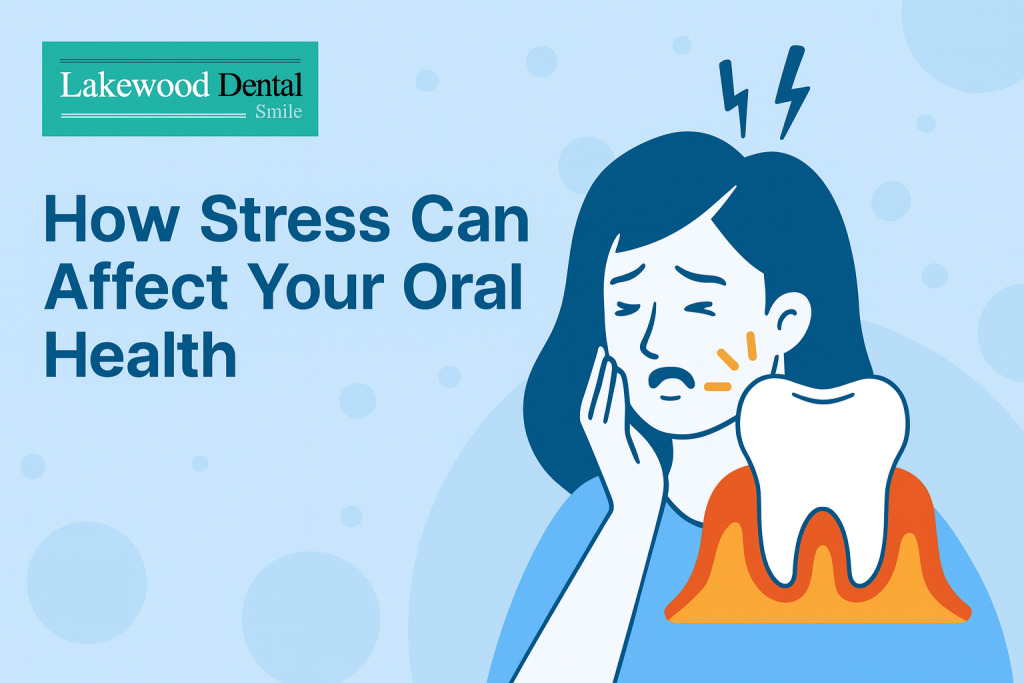Stress affects people of all ages, and its impact goes far beyond emotional strain. While most people associate stress with headaches, fatigue, or sleep problems, stress and oral health are also closely linked. Ongoing stress can weaken daily habits, affect your mouth’s natural defenses, and increase your risk of dental issues that may worsen over time. Understanding this connection helps you take early action and protect both your smile and overall wellness.
When stress builds up, the body’s natural response can interfere with saliva flow, immune strength, and oral hygiene routines. Even if you normally take good care of your teeth, stress can gradually change behavior and physical health in ways that make dental problems more likely.

1. Teeth Grinding and Clenching
Many people grind or clench their teeth without realizing it, especially during sleep. This habit, known as bruxism, is strongly connected to stress and oral health. Constant grinding can wear down enamel, cause jaw pain, and increase tooth sensitivity. In severe cases, teeth may crack or become loose over time.
Signs to watch for include morning headaches, tight jaw muscles, chipped teeth, or clicking when opening your mouth. Using a night guard, practicing relaxation techniques, and managing stress levels can help prevent long-term damage.
2. Poor Oral Hygiene Habits
Stress can make self-care feel less important. When daily routines are disrupted, people may forget to brush, skip flossing, or delay dental visits. Over time, plaque buildup increases, leading to cavities and gum inflammation.
Maintaining consistent habits is essential:
- Brush twice daily with fluoride toothpaste
- Floss or use a water flosser
- Replace your toothbrush every three months
- Schedule regular cleanings
Even small steps help protect your health during stressful periods.
3. Changes in Diet and Nutrition
Stress often affects eating behaviors. Some people snack more on sugary foods, while others skip meals entirely. Both patterns can harm stress and oral health. Teeth need vitamins, minerals, and calcium to stay strong—poor nutrition weakens the enamel and raises cavity risk.
Drinking plenty of water, choosing vegetables and dairy products, and limiting acidic or sugary foods can make a noticeable difference. A balanced diet supports both oral and overall wellness.
4. Increased Risk of Gum Disease
Stress weakens the immune system, making it harder for the body to fight infection. If gum irritation already exists, inflammation can worsen more quickly. Symptoms like bleeding gums, swelling, and persistent bad breath may indicate early gum disease.
If untreated, this can progress into periodontitis, which may lead to bone loss and tooth mobility. Early professional care and good hygiene can prevent complications and protect long-term oral health.
5. Dry Mouth and Mouth Sores
Stress reduces saliva production, causing dry mouth. Saliva protects teeth by neutralizing acids, washing away food particles, and supporting digestion. Without enough saliva, the risk of cavities, infections, and discomfort increases.
Stress may also trigger mouth sores or lip-biting habits. These usually heal on their own but should be monitored if they persist or worsen.
Managing Stress for Better Oral Health
You can support your stress and oral health by developing healthy coping strategies:
- Practice relaxation techniques like meditation or deep breathing
- Stay physically active
- Get enough sleep
- Drink water throughout the day
- Maintain a consistent oral care routine
If symptoms such as jaw pain, tooth sensitivity, or gum bleeding continue, a dentist can provide personalized guidance and treatment options.
When to Seek Professional Support
Persistent dental issues should never be ignored. If stress has begun affecting your oral health, early care prevents long-term problems and restores comfort.
If you’re in Dearborn, Michigan, Lakewood Dental Smile provides gentle, supportive care to help families manage stress-related dental concerns and maintain healthy, confident smiles.



